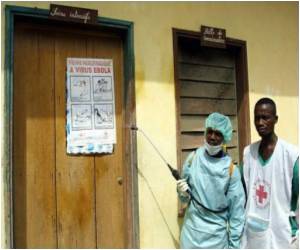Pentagon-backed research has yielded a breakthrough in the fight against the Ebola virus, a pathogen that is also feared as a future bioterror weapon, scientists reported on Friday.

It is the first time a drug has protected non-human primates against Ebola, a virus that is sometimes dubbed a "slate wiper" for its ruthless culling of lives.
Ebola is one of a family of so-called filoviruses, which cause haemorrhagic fever, a rare but highly lethal disease in which the patient can bleed to death, sometimes from the mouth, ears and eyes.
Five Ebola strains have been identified since the first case came to light at the Ebola River in Zaire, now the Democratic Republic of Congo, in 1976.
The deadliest is the Zaire strain, known to virologists by the acronym of ZEBOV (Zaire Ebola virus), which inflicts a death rate of 80 to 90 percent.
A team led by Thomas Geisbert of the National Emerging Infectious Diseases Laboratories Institute at Boston University School of Medicine tested the formula on two groups of rhesus macaque monkeys after getting promising results on guinea pigs.
Advertisement
In the first experiment, three monkeys were given a potentially mortal dose of ZEBOV and then innoculated with four doses of the drug on successive days. One of the animals died.
Advertisement
In both experiments, a "control" monkey that was not innoculated died from the virus.
Geisbert said the results marked a major step forward, although he cautioned that a long road lay ahead in further safety tests before the treatment could be licensed for humans.
"We believe this work justifies the immediate development of this treatment as an agent to treat EBOV-infected patients, either in outbreaks or accidental laboratory exposures," he said.
The work was funded by the Defense Threat Reduction Agency, a branch of the Pentagon that works on strategies against weapons of mass destruction.
According to the UN's World Health Organisation (WHO), about 1,850 cases of Ebola, with some 1,200 deaths, have occurred since 1976.
The virus has a natural reservoir in several species of African fruit bat. Gorillas and other non-human primates are also susceptible to the disease.
The study is published by The Lancet.
Source-AFP
SRM













